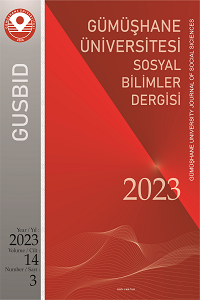The Effect of Financial Development, Globalization, and Industrialization on Load Capacity Factor in Turkey
Öz
This study investigates the long-term effect of economic growth, globalization, financial development, and industrialization on the load capacity factor (LCF) in Turkey. In addition, the study examined whether the load capacity curve (LCC) hypothesis is valid. For this purpose, annual data from 1970-2018 were used. Fourier ADF unit root test, Bayer-Hanck cointegration test, Fully Modified Least Squares (FMOLS), and Dynamic Least Squares (DOLS) techniques were used to analyze the data. Accordingly, when the results of the cointegration test were examined, it was determined that there was long-term cointegration between the series. Findings from FMOLS and DOLS approaches show that there is a U-shaped relationship between economic growth and LCF and reveal the existence of the LCC hypothesis for Turkey. In other words, the increase in per capita income harms environmental sustainability at the beginning but contributes to the improvement of environmental sustainability after a certain level is exceeded. However, it has been concluded that although globalization and financial development reduce the environmental quality, industrialization increases it. Therefore, globalization and finance policies can be adopted to encourage environmentally friendly practices can be adopted in order to ensure environmental sustainability.
Anahtar Kelimeler
Load Capacity Curve Financial Development Globalization Industrialization
Kaynakça
- Ahmed, Z., Zhang, B., & Cary, M. (2021). Linking economic globalization, economic growth, financial development, and ecological footprint: Evidence from symmetric and asymmetric ARDL. Ecological indicators, 121, 107060. https://doi.org/10.1016/j.ecolind.2020.107060.
- Baloch, M. A., Ozturk, I., Bekun, F. V., & Khan, D. (2021). Modeling the dynamic linkage between financial development, energy innovation, and environmental quality: does globalization matter?. Business Strategy and the Environment, 30(1), 176-184. https://doi.org/10.1002/bse.2615.
- Banerjee, A., Dolado, J., & Mestre, R. (1998). Error‐correction mechanism tests for cointegration in a single‐equation framework. Journal of time series analysis, 19(3), 267-283. https://doi.org/10.1111/1467-9892.00091. Bayer, C., & Hanck, C. (2013). Combining non-cointegration tests. Journal of Time Series Analysis, 34(1), 83–95. https://doi.org/10.1111/j.1467-9892.2012.00814.x
- Boswijk, H. P. (1995). Efficient inference on cointegration parameters in structural error correction models. Journal of Econometrics, 69(1), 133-158. https://doi.org/10.1016/0304-4076(94)01665-M.
- Crippa M., Guizzardi D., Banja M., Solazzo E., Muntean M., Schaaf E., et al. (2022). CO2 emissions of all world countries – JRC/IEA/PBL 2022 Report, Publications Office of the European Union, Luxembourg, https://doi.org/10.2760/07904.
- Dai, J., Ahmed, Z., Alvarado, R., & Ahmad, M. (2023). Assessing the nexus between human capital, green energy, and load capacity factor: policymaking for achieving Sustainable Development Goals. Gondwana Research. https://doi.org/10.1016/j.gr.2023.04.009.
- Dogan, A., & Pata, U. K. (2022). The role of ICT, R&D spending and renewable energy consumption on environmental quality: Testing the LCC hypothesis for G7 countries. Journal of Cleaner Production, 380, 135038. https://doi.org/10.1016/j.jclepro.2022.135038.
- Dogan, E., & Seker, F. (2016). The influence of real output, renewable and non-renewable energy, trade and financial development on carbon emissions in the top renewable energy countries. Renewable and Sustainable Energy Reviews, 60, 1074-1085. https://doi.org/10.1016/j.rser.2016.02.006.
Öz
Bu çalışma, Türkiye’de ekonomik büyüme, küreselleşme, finansal gelişme ve sanayileşme ile yük kapasite faktörü (LCF) arasındaki uzun dönem ilişkiyi araştırmaktadır. Ayrıca bu çalışmada yük kapasite eğrisi (LCC) hipotezinin geçerli olup olmadığı incelenmiştir. Bu amaç doğrultusunda 1970-2018 dönemine ait yıllık veriler kullanılmıştır. Söz konusu verilerin analiz edilmesi için Fourier ADF birim kök testi, Bayer-Hanck eşbütünleşme testi, Tam Düzeltilmiş En Küçük Kareler (FMOLS) ve Dinamik En Küçük Kareler (DOLS) tekniklerinden yararlanılmıştır. Buna göre çalışmada eşbütünleşme testi sonuçlarına bakıldığında seriler arasında uzun dönem eşbütünleşmenin olduğu belirlenmiştir. FMOLS ve DOLS tahmincilerinden elde edilen bulgular ise ekonomik büyüme ile LCF arasında U şeklinde bir ilişki olduğunu göstermekte ve Türkiye için LCC hipotezinin geçerliliğini ortaya koymaktadır. Diğer bir ifadeyle kişi başı gelirdeki artış başlangıçta çevresel sürdürebilirliğe zarar vermekte ancak belirli düzeyi geçtikten sonra çevresel sürdürebilirliğin artmasına katkıda bulunmaktadır. Bununla birlikte küreselleşmenin ve finansal gelişmenin çevre kalitesini azaltmasına karşın sanayileşmenin artırdığı sonucuna ulaşılmıştır. Dolayısıyla çevresel sürdürülebilirliğin sağlanabilmesi için çevre dostu uygulamaların teşvik edilmesine yönelik küreselleşme ve finans politikaları benimsenebilir.
Anahtar Kelimeler
Yük Kapasite Eğrisi Finansal Gelişme Küreselleşme Sanayileşme
Kaynakça
- Ahmed, Z., Zhang, B., & Cary, M. (2021). Linking economic globalization, economic growth, financial development, and ecological footprint: Evidence from symmetric and asymmetric ARDL. Ecological indicators, 121, 107060. https://doi.org/10.1016/j.ecolind.2020.107060.
- Baloch, M. A., Ozturk, I., Bekun, F. V., & Khan, D. (2021). Modeling the dynamic linkage between financial development, energy innovation, and environmental quality: does globalization matter?. Business Strategy and the Environment, 30(1), 176-184. https://doi.org/10.1002/bse.2615.
- Banerjee, A., Dolado, J., & Mestre, R. (1998). Error‐correction mechanism tests for cointegration in a single‐equation framework. Journal of time series analysis, 19(3), 267-283. https://doi.org/10.1111/1467-9892.00091. Bayer, C., & Hanck, C. (2013). Combining non-cointegration tests. Journal of Time Series Analysis, 34(1), 83–95. https://doi.org/10.1111/j.1467-9892.2012.00814.x
- Boswijk, H. P. (1995). Efficient inference on cointegration parameters in structural error correction models. Journal of Econometrics, 69(1), 133-158. https://doi.org/10.1016/0304-4076(94)01665-M.
- Crippa M., Guizzardi D., Banja M., Solazzo E., Muntean M., Schaaf E., et al. (2022). CO2 emissions of all world countries – JRC/IEA/PBL 2022 Report, Publications Office of the European Union, Luxembourg, https://doi.org/10.2760/07904.
- Dai, J., Ahmed, Z., Alvarado, R., & Ahmad, M. (2023). Assessing the nexus between human capital, green energy, and load capacity factor: policymaking for achieving Sustainable Development Goals. Gondwana Research. https://doi.org/10.1016/j.gr.2023.04.009.
- Dogan, A., & Pata, U. K. (2022). The role of ICT, R&D spending and renewable energy consumption on environmental quality: Testing the LCC hypothesis for G7 countries. Journal of Cleaner Production, 380, 135038. https://doi.org/10.1016/j.jclepro.2022.135038.
- Dogan, E., & Seker, F. (2016). The influence of real output, renewable and non-renewable energy, trade and financial development on carbon emissions in the top renewable energy countries. Renewable and Sustainable Energy Reviews, 60, 1074-1085. https://doi.org/10.1016/j.rser.2016.02.006.
Ayrıntılar
| Birincil Dil | Türkçe |
|---|---|
| Bölüm | Makaleler |
| Yazarlar | |
| Yayımlanma Tarihi | 9 Ekim 2023 |
| Gönderilme Tarihi | 10 Mayıs 2023 |
| Yayımlandığı Sayı | Yıl 2023 Cilt: 14 Sayı: 3 |



